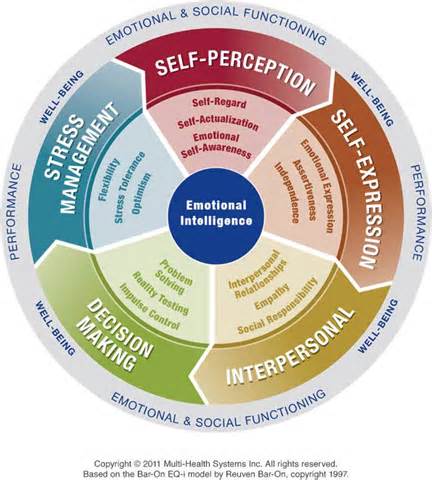 Emotional Intelligence (EQ) is often a better predictor of success than IQ, subject matter expertise or items highlighted on a resume, but many organizations and selection panels still aren’t using this powerful lens. If you’re not considering Emotional Intelligence in your selection process—you’re missing an important aspect of what would make your next hire a successful leader or team contributor and a good fit for your organization. At OKA, we help clients consider this important performance dimension in a variety of ways, but I’ll share one of the easiest, most effective and least expensive ways here. The Emotional Intelligence informed interview can make a big impact without breaking the bank or requiring a massive process overhaul.
Emotional Intelligence (EQ) is often a better predictor of success than IQ, subject matter expertise or items highlighted on a resume, but many organizations and selection panels still aren’t using this powerful lens. If you’re not considering Emotional Intelligence in your selection process—you’re missing an important aspect of what would make your next hire a successful leader or team contributor and a good fit for your organization. At OKA, we help clients consider this important performance dimension in a variety of ways, but I’ll share one of the easiest, most effective and least expensive ways here. The Emotional Intelligence informed interview can make a big impact without breaking the bank or requiring a massive process overhaul.
An approach many organizations take
If you’re not happy with the “soft skills” of recent hires or think you can do better—your interview process likely:
- Doesn’t ask and consider any Emotional Intelligence related questions and responses; or
- Asks questions related to Emotional Intelligence, but fails to identify and define the desired competency or behavior—or to make the deliberate connection between performance and these specific Emotional Intelligence behaviors.
In the 1st case, key performance aspects are missed altogether. In the 2nd case, an adhoc, subjective approach leaves hiring panels struggling to identify and communicate the truly discriminating factors among candidates or the criticality of those differences.
 Another Way
Another Way
We like to take an approach where we establish a common vocabulary and understanding of each EQ behavior, identify the behaviors most important—and then explore those behaviors in the interview. This is a simple but powerful and often liberating approach for many hiring panels.
- Identify star performer attributes and wanted behaviors. Start by considering the competencies, skills or behaviors you are looking for, and identify those that are related to Emotional Intelligence. You will use these to help focus the Emotional Intelligence aspect of the selection process. If you need help identifying these behaviors you could swap steps 1 and 2.
- Select the best EQ framework. There are many you can use, but you should use one that supports the skills and behaviors you are looking to evaluate. At OKA, we most use the EQ-i2.0 model. We like this framework because it:
- Gives you access to Stress Management and Decision Making behaviors not directly accessible in other frameworks
- Allows you to look at 5 broad composites (such as self-perception) and 15 distinct behaviors (such as Assertiveness). This offers a more specific and focused look at EQ behaviors not possible with other frameworks. This specific look is especially helpful in the selection context
- Has a psychometrically valid and reliable talent development assessment that can be used for both selection and development
- Prepare the Hiring Panel. The hiring panel should have a common understanding of the EQ framework being used and how the EQ behaviors contribute to success within the organization and that particular role. OKA likes to hold a focused workshop with the hiring team to gain this common understanding and also to provide a development and team building opportunity for the hiring panel.
- Develop and Conduct an EQ-informed Interview. Armed with the attributes and behaviors most critical to success, derive or select tailored interview questions. These EQ-focused interview questions will provide a much better understanding of the candidate’s Emotional Intelligence and likely success on the job.
- Include EQ information in the Selection Process. Include the information gleaned from the EQ aspect of the interview process with other relevant data to help select the best overall candidate.
This deliberate Emotional Intelligence approach to a portion of your normal interview process will improve your ability to assess, evaluate and compare these important success factors.

The Emotional Intelligence informed interview in action
This set of EQ behaviors and supporting questions for a Sales Manager offers one example of how you can operationalize this approach. Considering the role and the company culture, it was determined that Assertiveness, Empathy, Optimism and Social Responsibility were important behaviors needed for success (all Emotional Intelligence skills or behaviors from the EQ-i2.0 model). The following interview questions were then developed and asked to help assess candidates in these areas:
Assertiveness (your ability to put your needs, thoughts and opinions out into the world—even when doing so invites opposition or conflict or causes you to take a stand): Tell me about a time when you disagreed with someone. What did you do or say, and what was the outcome?
Empathy (your ability and willingness to take notice of and be sensitive to other people’s needs and feelings): How do you make your clients feel heard and understood?
Social Responsibility (your ability and tendency to cooperate and contribute to the welfare of a larger social system, to have and act in accordance with a social consciousness and to show concern for the greater community): Tell me about a time when you acted as a team player, serving the needs of the group, and describe a time when your success was due as much to a team effort as to your individual effort.
Optimism (your ability and tendency to look at the brighter side of life and to maintain a positive attitude even in the face of adversity. Optimism gives you hope and enables you to see the future as a positive, inviting place): Describe a project or task where you experienced disappointment or setbacks. What was your approach to overcoming these difficulties?
These might look like questions you have asked or have been asked yourself in the past, but if they fell short–it’s because they weren’t considered in the context of specific behaviors and how those behaviors contribute to success. Focusing on these Emotional Intelligence behaviors in the interview gave the panel a much better sense of how the candidates had behaved in the past, suggesting how they would likely act in the future–in the context of skills identified as being important to success. These data, coupled with information about their credentials, experience and technical skills, helped the panel make a much more informed decision about the complete person.
Interested in more information?
OKA can help you hire candidates with high EQ. We can:
- Help you identify the most important competencies
- Train your hiring panel
- Develop tailored interview questions
- Support the interview panel during the interview process
- Administer and interpret the EQ-i 2.0 for selected candidates
- Certify your internal team to use the EQ-i 2.0
I would be excited to talk more about your needs and how we might help. I am available at hfanaroff@oka-online.com.

Leave a Comment